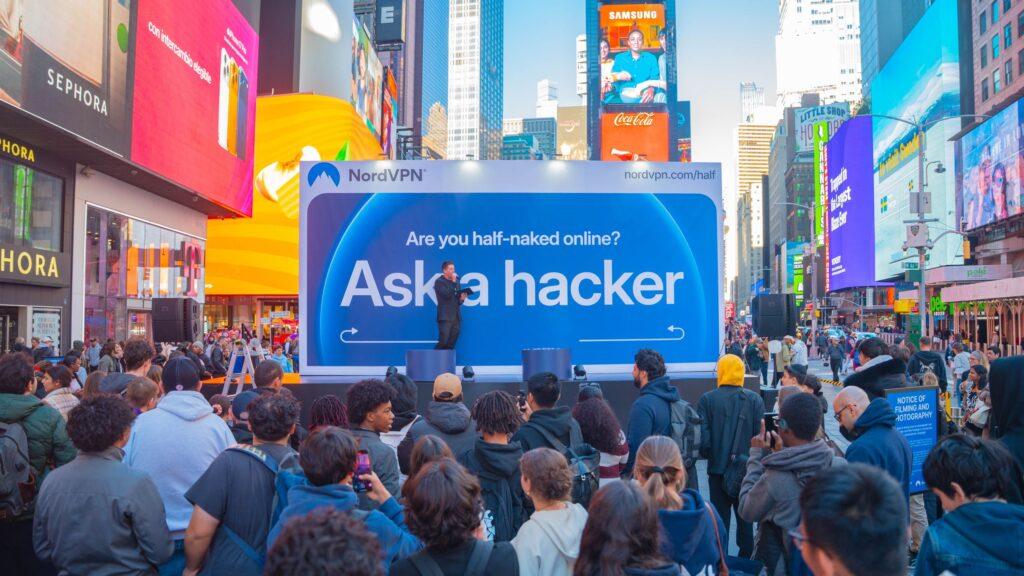A white and blue billboard, a stage and two chairs in the middle of Times Square to connect passers-by with three ethical hackers. That’s all NordVPN needed to shatter New Yorkers’ misconceptions about online security, starting with a simple question: Are you half-naked online?
A handful of minutes was enough for Marijus Briedis (CTO at NordVPN), Adrianus Warmenhoven (Cybersecurity Advisor at NordVPN) and Liron Segev (the popular YouTuber known as TheTechieGuy) to reveal to the participants how they are really exposed online.
The “Talk to a Hacker” stunt is part of a wider campaign for NordVPN. The company is on a mission to help Americans understand that even the best antivirus solutions are only half of the online protection that everyone needs to stay safe on the Internet.
It comes after some disappointing responses from Americans to NordVPN’s latest survey.
A staggering 73% of Americans still believe their antivirus software protects them from identity theft, guarantees online privacy and secures their data on public Wi-Fi networks. However, the job of an antivirus is rather to defend your device against malware and viruses instead.
“Such widespread misunderstanding about online protection is exactly why we created this campaign,” said Toma Sabaliauskiene, CMO at NordVPN.
“Americans are walking around with a dangerous false sense of security. It’s like installing a sophisticated alarm system on your front door while leaving all your windows wide open. Our Times Square experience showed this vulnerability live and up close.”
Americans’ interests, addresses and even passwords exposed
A crowd of curious New Yorkers gathered around NordVPN’s billboard on Thursday, October 16. Still, those who actually participated in the initiative left with a new sense of security – they are not as private and secure online as they think.
The three hackers generated detailed reports on participants revealing how their most sensitive data was exposed online. These include their passwords, phone numbers, home addresses, social security numbers and sometimes even the make and model of the car they drive.
The amount of detail available was so personal that the hackers were even able to identify people’s interests and most used usernames, as well as name their favorite bands.
“We saw real shock on people’s faces when they realized how vulnerable they really were. Many were visibly shocked to learn that their current software had been giving them a false sense of security all along,” Sabaliauskiene said.
That moment of surprise and realization was exactly what NordVPN was aiming for with this campaign.
A virtual private network (VPN) is certainly not a magic wand either. Still, it’s a crucial tool to help you minimize your digital footprint while making it harder to track you online from site to site. It does this by encrypting all your internet connections and spoofing your real IP address.
A secure VPN is especially important to protect yourself when connecting to a pubic Wi-Fi — something that nearly 40% of Americans said they did, but more than half of them without protection.
NordVPN even includes its Threat Protection Pro tool to protect users from online scams, malware, and annoying ads. However, we still recommend bundling this with a proper antivirus software.
Online threats are becoming more and more multifaceted, and so should your security. And remember, “While people rightly worry about social security numbers and credit card information, a leak of contact information is often the critical first domino to fall,” warns NordVPN.
If you missed your chance to have your digital persona scanned by NordVPN experts, don’t worry. Anyone, in and out of the US, can do so by going to nordvpn.com/half to access the company’s dedicated campaign page.
There, you’ll get the chance to use NordVPN’s Dark Web Monitor tool for free to check if your data is already exposed on the dark web, while learning how to strengthen your online protection.



